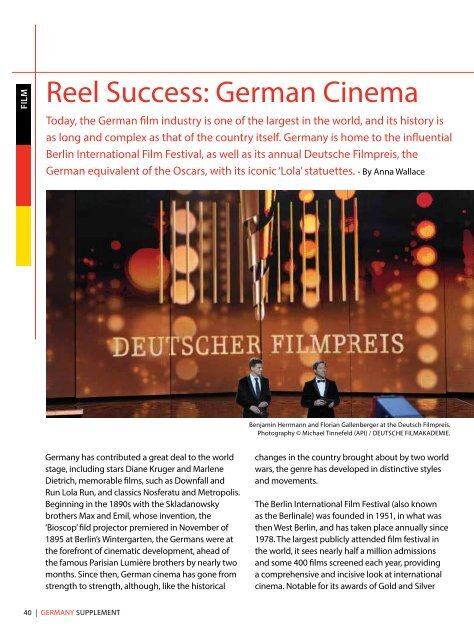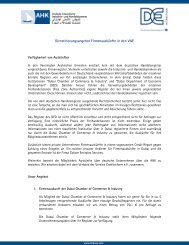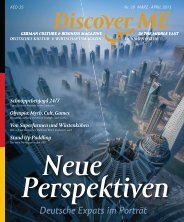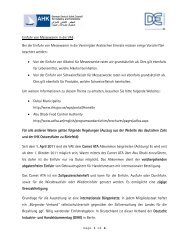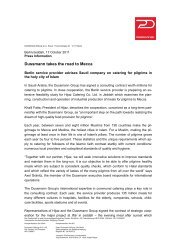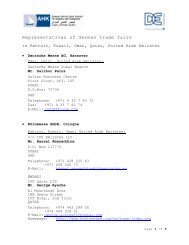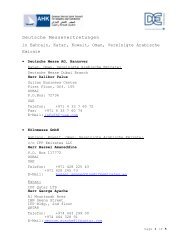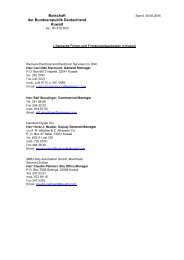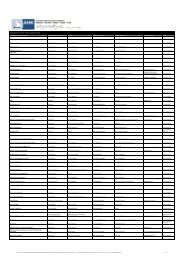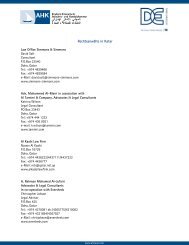germany - AHK - AHKs
germany - AHK - AHKs
germany - AHK - AHKs
You also want an ePaper? Increase the reach of your titles
YUMPU automatically turns print PDFs into web optimized ePapers that Google loves.
FILM<br />
Reel Success: German Cinema<br />
Today, the German film industry is one of the largest in the world, and its history is<br />
as long and complex as that of the country itself. Germany is home to the influential<br />
Berlin International Film Festival, as well as its annual Deutsche Filmpreis, the<br />
German equivalent of the Oscars, with its iconic ‘Lola’ statuettes. - By Anna Wallace<br />
Germany has contributed a great deal to the world<br />
stage, including stars Diane Kruger and Marlene<br />
Dietrich, memorable films, such as Downfall and<br />
Run Lola Run, and classics Nosferatu and Metropolis.<br />
Beginning in the 1890s with the Skladanowsky<br />
brothers Max and Emil, whose invention, the<br />
‘Bioscop’ fild projector premiered in November of<br />
1895 at Berlin’s Wintergarten, the Germans were at<br />
the forefront of cinematic development, ahead of<br />
the famous Parisian Lumière brothers by nearly two<br />
months. Since then, German cinema has gone from<br />
strength to strength, although, like the historical<br />
Benjamin Herrmann and Florian Gallenberger at the Deutsch Filmpreis.<br />
Photography © Michael Tinnefeld (API) / DEUTSCHE FILMAKADEMIE.<br />
changes in the country brought about by two world<br />
wars, the genre has developed in distinctive styles<br />
and movements.<br />
The Berlin International Film Festival (also known<br />
as the Berlinale) was founded in 1951, in what was<br />
then West Berlin, and has taken place annually since<br />
1978. The largest publicly attended film festival in<br />
the world, it sees nearly half a million admissions<br />
and some 400 films screened each year, providing<br />
a comprehensive and incisive look at international<br />
cinema. Notable for its awards of Gold and Silver<br />
Bears, it has been headed by Festival Director Dieter<br />
Kosslick since 2001 and categories include a Jury<br />
Grand Prix, Best Director, Actor, Actress and Short<br />
Film, among others.<br />
Attracting film stars and celebrities from all over<br />
the world as well as within Germany, the<br />
Berlinale is divided into seven distinct sections,<br />
for which films are chosen by a committee.<br />
These categories comprise Competition<br />
(feature-length films as yet unreleased outside<br />
of their country of origin), Panorama (indie<br />
and art house films), Forum (documentary<br />
films), Generation (aimed at youth), Perspektive<br />
Deutsches Kino (focusing on current trends<br />
in German cinema), Berlinale Shorts (both<br />
domestic and international) and Retrospective<br />
(classic films previously shown at the Berlinale)<br />
as well as other subcategories.<br />
The 2012 edition of the Berlinale was hailed<br />
by many as one of the best incarnations in recent<br />
history, with critics lauding it for its strong content.<br />
“Everything was just right: there were strong films<br />
and the film market was the best attended since its<br />
creation. Ticket sales reached a new record,” wrote<br />
Peter Zander, a journalist at the German newspaper<br />
Die Welt.<br />
The 62nd edition also featured several films related<br />
to the Arab spring as part of its global remit.<br />
Held at the same time as the Berlinale, the European Film<br />
Market (EFM) is a trade fair that acts as a major industry<br />
meeting point for the international film circuit. Bringing<br />
together producers, financiers, distributors and other<br />
key players in the industry, it also features lectures and<br />
workshops and is partnered with the Berlinale as a forum<br />
for upcoming and emerging talent.<br />
For more information visit www.efm-berlinale.de<br />
Another major player on the German film scene is the<br />
annual Deutscher Filmpreis, or German Film Awards,<br />
colloquially known as the Lolas (after its awards<br />
statuette). With its pot of three million Euros in cash<br />
prizes, it is the most highly endowed German cultural<br />
award and, since 2005, has been provided by the<br />
Deutsche Filmakademie.<br />
For more information visit www.deutscher-filmpreis.de<br />
“[The Arab Spring] cuts right across all the sections,”<br />
festival director Kosslick explained in an interview<br />
on website for the the Goethe-Institut Australia.<br />
Meryl Streep receives the Honorary Golden Bear at the 64th Berlinale.<br />
“Filmmaking from this region is well represented<br />
and is being discussed at various points. We will<br />
have many documentaries on the Arab region…<br />
and there are six Arabic films in the Panorama<br />
section...” The event also featured panel discussions<br />
with Arab filmmakers. With press from nearly 90<br />
countries covering the event, it’s no wonder that the<br />
Berlinale, with its wide array of international films,<br />
styles, genres and subject matter, is considered a<br />
leader in its field.<br />
62nd Berlin Film Festival<br />
at a Glance<br />
Dates: 9–19 February 2012<br />
Festival Director: Dieter Kosslick<br />
Jury President: Mike Leigh<br />
Number of Films: 400 over 953 public screenings<br />
Theatre visits: 444,402<br />
Accredited Guests: 15,923<br />
Jury Grand Prix: Just the Wind, Benedek Fliegauf<br />
Best Director: Christian Petzold, Barbara<br />
Best Actress: Rachel Mwanza, War Witch<br />
Best Actor: Mikkel Følsgaard, A Royal Affair<br />
Honorary Golden Bear: Meryl Streep<br />
Website: www.berlinale.de<br />
40 | GERMANY SUPPLEMENT GERMANY SUPPLEMENT | 41<br />
Image courtesy Berlinale.


